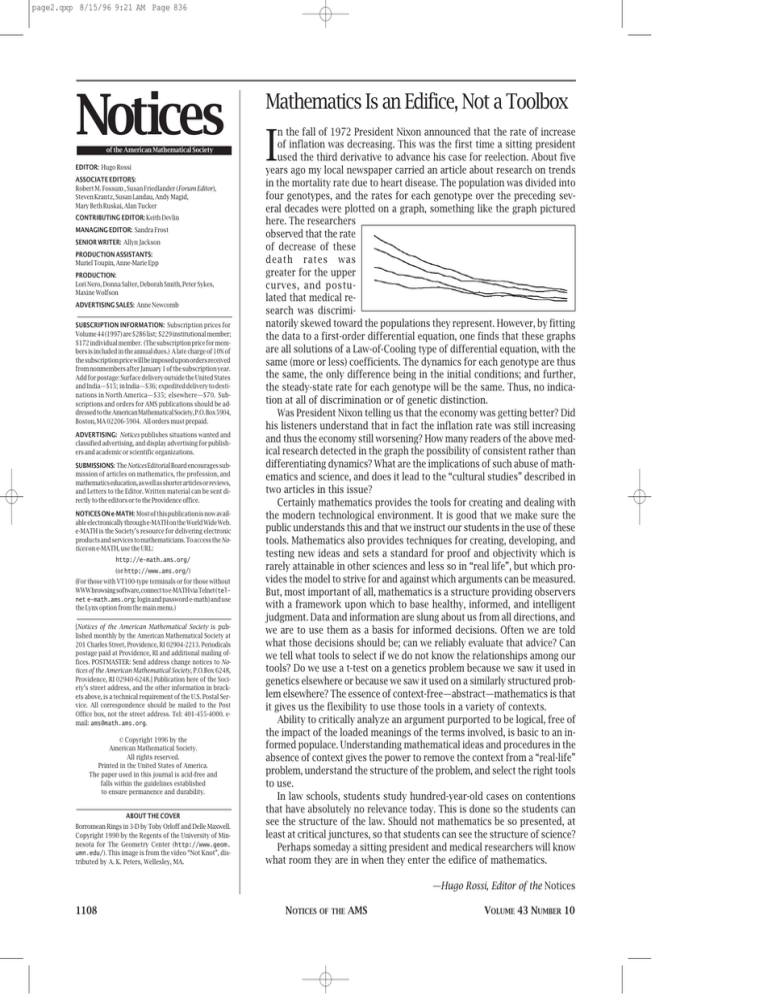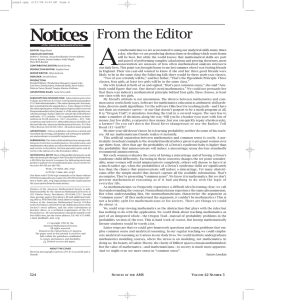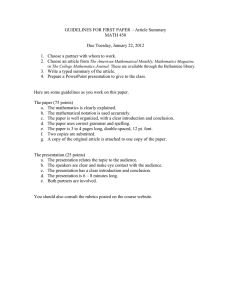
page2.qxp 8/15/96 9:21 AM Page 836
Notices
of the American Mathematical Society
EDITOR: Hugo Rossi
ASSOCIATE EDITORS:
Robert M. Fossum , Susan Friedlander (Forum Editor),
Steven Krantz, Susan Landau, Andy Magid,
Mary Beth Ruskai, Alan Tucker
CONTRIBUTING EDITOR: Keith Devlin
MANAGING EDITOR: Sandra Frost
SENIOR WRITER: Allyn Jackson
PRODUCTION ASSISTANTS:
Muriel Toupin, Anne-Marie Epp
PRODUCTION:
Lori Nero, Donna Salter, Deborah Smith, Peter Sykes,
Maxine Wolfson
ADVERTISING SALES: Anne Newcomb
SUBSCRIPTION INFORMATION: Subscription prices for
Volume 44 (1997) are $286 list; $229 institutional member;
$172 individual member. (The subscription price for members is included in the annual dues.) A late charge of 10% of
the subscription price will be imposed upon orders received
from nonmembers after January 1 of the subscription year.
Add for postage: Surface delivery outside the United States
and India—$15; in India—$36; expedited delivery to destinations in North America—$35; elsewhere—$70. Subscriptions and orders for AMS publications should be addressed to the American Mathematical Society, P.O. Box 5904,
Boston, MA 02206-5904. All orders must prepaid.
ADVERTISING: Notices publishes situations wanted and
classified advertising, and display advertising for publishers and academic or scientific organizations.
SUBMISSIONS: The Notices Editorial Board encourages submission of articles on mathematics, the profession, and
mathematics education, as well as shorter articles or reviews,
and Letters to the Editor. Written material can be sent directly to the editors or to the Providence office.
NOTICES ON e-MATH: Most of this publication is now available electronically through e-MATH on the World Wide Web.
e-MATH is the Society’s resource for delivering electronic
products and services to mathematicians. To access the Notices on e-MATH, use the URL:
http://e-math.ams.org/
(or http://www.ams.org/)
(For those with VT100-type terminals or for those without
WWW browsing software, connect to e-MATH via Telnet (telnet e-math.ams.org; login and password e-math) and use
the Lynx option from the main menu.)
[Notices of the American Mathematical Society is published monthly by the American Mathematical Society at
201 Charles Street, Providence, RI 02904-2213. Periodicals
postage paid at Providence, RI and additional mailing offices. POSTMASTER: Send address change notices to Notices of the American Mathematical Society, P.O.Box 6248,
Providence, RI 02940-6248.] Publication here of the Society’s street address, and the other information in brackets above, is a technical requirement of the U.S. Postal Service. All correspondence should be mailed to the Post
Office box, not the street address. Tel: 401-455-4000. email: ams@math.ams.org.
© Copyright 1996 by the
American Mathematical Society.
All rights reserved.
Printed in the United States of America.
The paper used in this journal is acid-free and
falls within the guidelines established
to ensure permanence and durability.
ABOUT THE COVER
Borromean Rings in 3-D by Toby Orloff and Delle Maxwell.
Copyright 1990 by the Regents of the University of Minnesota for The Geometry Center (http://www.geom.
umn.edu/). This image is from the video “Not Knot”, distributed by A. K. Peters, Wellesley, MA.
Mathematics Is an Edifice, Not a Toolbox
I
n the fall of 1972 President Nixon announced that the rate of increase
of inflation was decreasing. This was the first time a sitting president
used the third derivative to advance his case for reelection. About five
years ago my local newspaper carried an article about research on trends
in the mortality rate due to heart disease. The population was divided into
four genotypes, and the rates for each genotype over the preceding several decades were plotted on a graph, something like the graph pictured
here. The researchers
observed that the rate
of decrease of these
death rates was
greater for the upper
curves, and postulated that medical research was discriminatorily skewed toward the populations they represent. However, by fitting
the data to a first-order differential equation, one finds that these graphs
are all solutions of a Law-of-Cooling type of differential equation, with the
same (more or less) coefficients. The dynamics for each genotype are thus
the same, the only difference being in the initial conditions; and further,
the steady-state rate for each genotype will be the same. Thus, no indication at all of discrimination or of genetic distinction.
Was President Nixon telling us that the economy was getting better? Did
his listeners understand that in fact the inflation rate was still increasing
and thus the economy still worsening? How many readers of the above medical research detected in the graph the possibility of consistent rather than
differentiating dynamics? What are the implications of such abuse of mathematics and science, and does it lead to the “cultural studies” described in
two articles in this issue?
Certainly mathematics provides the tools for creating and dealing with
the modern technological environment. It is good that we make sure the
public understands this and that we instruct our students in the use of these
tools. Mathematics also provides techniques for creating, developing, and
testing new ideas and sets a standard for proof and objectivity which is
rarely attainable in other sciences and less so in “real life”, but which provides the model to strive for and against which arguments can be measured.
But, most important of all, mathematics is a structure providing observers
with a framework upon which to base healthy, informed, and intelligent
judgment. Data and information are slung about us from all directions, and
we are to use them as a basis for informed decisions. Often we are told
what those decisions should be; can we reliably evaluate that advice? Can
we tell what tools to select if we do not know the relationships among our
tools? Do we use a t-test on a genetics problem because we saw it used in
genetics elsewhere or because we saw it used on a similarly structured problem elsewhere? The essence of context-free—abstract—mathematics is that
it gives us the flexibility to use those tools in a variety of contexts.
Ability to critically analyze an argument purported to be logical, free of
the impact of the loaded meanings of the terms involved, is basic to an informed populace. Understanding mathematical ideas and procedures in the
absence of context gives the power to remove the context from a “real-life”
problem, understand the structure of the problem, and select the right tools
to use.
In law schools, students study hundred-year-old cases on contentions
that have absolutely no relevance today. This is done so the students can
see the structure of the law. Should not mathematics be so presented, at
least at critical junctures, so that students can see the structure of science?
Perhaps someday a sitting president and medical researchers will know
what room they are in when they enter the edifice of mathematics.
—Hugo Rossi, Editor of the Notices
1108
NOTICES
OF THE
AMS
VOLUME 43 NUMBER 10






